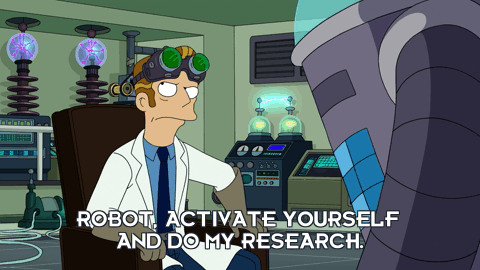As the semester comes to an end, I’ve been thinking about the writing aspect of teaching. Given the current concerns over A.I., and the ridiculous claims that educators cannot tell the difference between human writing and computer-generated writing, I’d like to offer a few thoughts worth considering over the Summer.1 While this is probably of most interest to college teachers in the humanities, I think the ideas here have something of value for teachers in any classroom where students are expected to work independently to demonstrate what they’ve learned, particularly if those students have access to the Internet.
There has been a lot of chatter online about the need to return to blue books in the classroom, which is probably more than many colleges and universities will tolerate for students who can barely write as it is. And there has been the perennial argument that you just need to design assignments so that students “can’t” cheat on them, which I firmly believe is an impossibility. Neither option solves the problem, though each of those offer salves to bandage the wound, to some degree. Some of the assumptions embedded in these solutions include 1) the notion that all collegiate work is valuable (a claim I doubt), 2) that students who don’t have easy options will default to doing the right thing (a claim that I reject), and 3) that large cultural problems can be solved in isolated college classrooms (which is simple nonsense on a Mock Turtle scale).
I maintain that the problem of writing in the college classroom is actually just a symptom of a problem with our culture’s view of college in general. When it became apparent that our society expected every student to go to college, or at least the vast majority of them to do so, no one stopped to consider what would happen when students decided they didn’t want to be there. This stems from the same kind of optimism that holds every student is not just capable but ought to be a genius.2 Freddie deBoer’s frequent refutation of this position may be a bit stronger than I prefer, but at the same time, he’s not wrong. Not every student should be told that they need a college degree. I won’t belabor that point here but be sure that it is something that underpins my thinking.
The surest sign that not everyone should go to college is the fact that so many students cheat.3 My friend
wrote a really great piece that opens by challenging this idea, but I think the data reveals that cheating has been a large-scale problem in higher education for the last four decades. Philip’s essay is great and hits a lot of excellent points, so you should go read it. But I think by eliminating the prevalence of cheating from the discussion of A.I. cheating, an important aspect is omitted. Like Philip, I think A.I. has made this problem more visible, but that’s also because I think lots of students were getting by with Low Key Cheating in their writing.4 This is where students don’t really engage the material or learn the material but figure out how to game the system with summaries, and paraphrases, and weak citations. As soon as A.I. became an option, many of these Low-Key Cheating students (LKC) simply migrated to the Machine-Learning Cheating (MLC) category.5 And the significant uptick in MLC students suggests that the problem is more than a poorly designed assignment.The solution to the cheating scandal, and I think to the grip that MLC currently has on many aspects of life outside the Academy, begins with the hard work of reviving a more robust understanding of the vocational life. So long as people believe that machines “can do the work,” they will rely on machines to do the work. What does this mean for colleges? As recently as 2012, researchers found that having more selective admissions, enrolling fewer students, and having a high percentage of students living on campus all helped combat cheating.6 This is common sense, and I think provides the best solution to solving the serious problems facing students in the humanities. Taking steps like these are a surefire way to restore the human part of such courses and the writing that accompanies it.
But what about teachers in the classroom? Many schools have adopted a “Teach the tool” approach, where the belief is that since students “are going to use it anyways, we need to teach them to use it rightly.” For teachers in this situation, I sympathize. Some schools are very pushy about this, not merely suggesting teachers deploy A.I. in the classroom but going as far as to mandate it (including all the bureaucratic workshops that accompany such flighty policy overhauls). This is playing with fire, and I am confident it will end in disaster.
I have two suggestions for teachers who want to take the fight to A.I. but haven’t found any solace in becoming a Luddite or in becoming the greatest assessment designer ever.
The first one is simple: love your work. Assessments can be great, but they are rarely as important as the role a teacher plays in the education of a student. As I learned a long time ago, students will very often learn to love what their teachers love, especially when they learn to admire the teacher. I often tell new teachers that my love of sushi came from reading Hemingway, but in truth it came from my Hemingway professor, a man I continue to draw inspiration from in the classroom and in my writing. The life of the mind should be compelling for those interested in education, at least for those in higher education, and it needs to be grounded in the actual humans it shapes. To love German opera, without loving the people it is meant to form, is to miss at least half of the point. The discipline is a part of the work but training up students is the bulk of the project. That is the part that requires the most love.
The second one is harder, but not impossible: design work you want to read. This is perhaps just a variation on the previous point, but I think it’s distinct enough to ponder independently. I’ve read hundreds of essays over the last fifteen years, some of them designed from my own prompts and some designed from the prompts of others.7 The latter often means reading a paper I’m disinterested in, which is bad for the student and bad for me (but this is how many colleges operate). However, when I design my own prompts, there is a much better chance the students will produce work I want to read. This may sound selfish, but that’s misunderstanding the order of operations in education. So many teachers I’ve met love their discipline but wind up teaching classes they hate. Maybe they’re not curious any longer and only want to specialize? If so, they don’t belong in the classroom. Education is not improved by hyper-specialization. But by continuing to be curious, teachers can more easily create assignments that are worth reading.
If you’re wondering how this relates to students cheating and how to stop them, then you’re still asking the wrong questions. Students cheat. In large quantities. And this is a cultural problem. No single teacher is going to right that ship by using blue books or giving inspirational speeches. And the institutional forces are exacerbating the MLC problem by telling students to use the “tool” which will lead them astray. I don’t see any way a single teacher can fix that one either. But teachers can do their job well. A good teacher can make a difference, after all. We all just need to remember the scale of our vocational influence.
Alternatively, we can continue to believe nonsense about A.I.’s helpfulness and our students’ inherent goodness, which will somehow “save the blooming human race.”
It is worth noting that the study used as the basis for the Forbes article is this one: https://journals.plos.org/plosone/article?id=10.1371/journal.pone.0305354. The study looks at a Psychology program with assignments submitted online, which is fraught with problems on its own. Applying the same approach to a history course taught in person would likely yield the opposite results. The Social Sciences are simply more prone to being deceived, which is what led to the replication crisis in the first place. See this study for a recent look at what this has meant specifically for psychology: https://www.pnas.org/doi/10.1073/pnas.2208863120.
I consider this optimism rather than a delusion because the folks I know who believe this have rational thought processes which lead them here. I also happen to think those processes reach the wrong conclusions.
As early as 1980, up to 75% of students said they cheated in college. That is incredibly early in the Everyone Needs a College Degree movement, which I think shows the wrongheadedness of the shift was manifest from the beginning. Cf. John Baird, Jr., “Current Trends in College Cheating,” Psychology in the Schools Vol 17 (1980), pp. 515-522. https://onlinelibrary.wiley.com/doi/abs/10.1002/1520-6807(198010)17:4%3C515::AID-PITS2310170417%3E3.0.CO;2-3.
I would wager that cheating spans the disciplines, and I have known more than one business major who admitted to cheating throughout their math-related courses. But my concern at this juncture is the humanities.
I know that some think that using A.I. is not cheating. But if you ask A.I. for a summary of a book you didn’t read, then that’s cheating in the Academy (and we won’t even touch the large-scale theft of books which A.I. companies commit to provide the summary in the first place). Reading is the job. People justify not doing their jobs all the time, so this is expected. But that doesn’t change what it is. If a person was hired to fix a car, then sat around while a machine did it, that person would be fired. Why pay someone to not do the job? This seems straightforward to me and without any gray area. I will add that someone who is not a college student or another person whose job depends on reading might still be tempted to use A.I. in this way. This would be in my view lazy at best and unethical at worst. Thus, it still ends up being the wrong path.
This was before the explosion of A.I. slop, and yet the principles which undergird these findings still apply equally to MLC students. L. McCabe & Linda Klebe Trevino, “What We Know About Cheating In College: Longitudinal Trends and Recent Developments,” Change: The Magazine of Higher Learning, 28:1 (1996): 28-33. https://doi.org/10.1080/00091383.1996.10544253.
I’ve done a quick estimate, and it comes out to around 1,300 student essays since 2015. Since I started teaching full-time in 2010, the number is certainly higher.








This was excellent. I appreciate this. Thank you.